UNIBUC_RE_lab_2
This lab is about figuring out what assembly language translates to in C
- 1
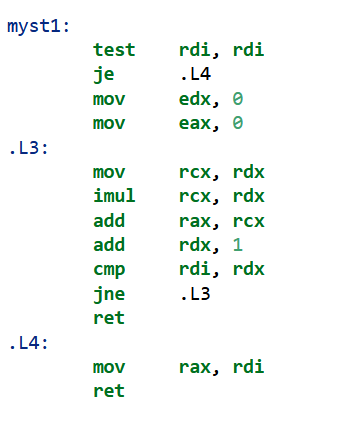
So test rdi,rdi and then je means that if rdi=0 it returns 0
if (rdi==0)
return 0;
do
{
rcx+=rdx*rdx;
rdx+=1;
}while (rdx!=rdi);
return rdx;
Compute the sum of squares for i->0,rdi
- 2
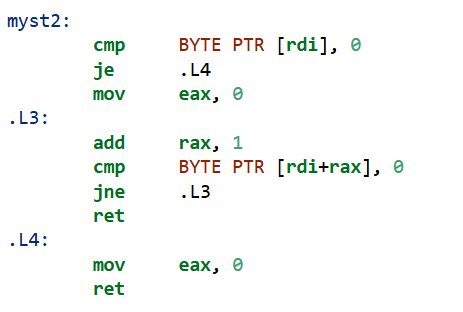 counter=0
while (*(i+counter)!=0)
{
counter+=1
}
return counter
counter=0
while (*(i+counter)!=0)
{
counter+=1
}
return counter
This program is strlen
- 3
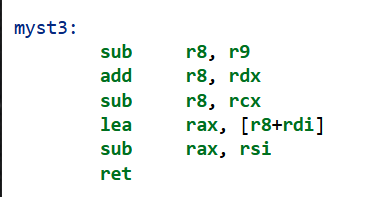
return v_rdi+v_r8+v_drx-v_rsi-v_rcd-v_r9
- 4
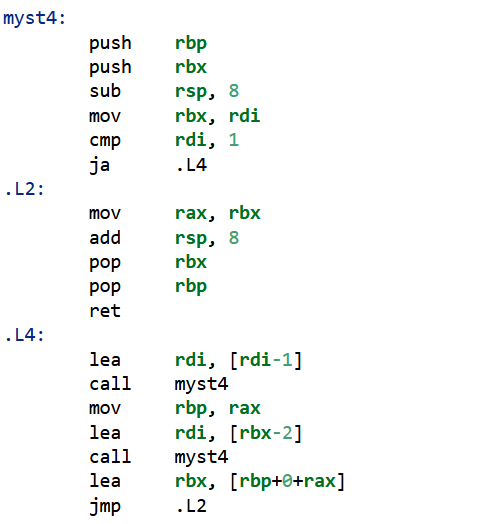
ulong entry(ulong param_1)
{
long lVar1;
long lVar2;
if (1 < param_1) {
lVar1 = entry(param_1 - 1);
lVar2 = entry(param_1 - 2);
param_1 = lVar1 + lVar2;
}
return param_1;
}
-
5
 ```
undefined8 entry(ulong param_1)
{
ulong uVar1;
if (1 < param_1) {
if (param_1 < 4) {
return 1;
}
if ((param_1 & 1) != 0) {
uVar1 = 2;
do {
uVar1 = uVar1 + 1;
if (param_1 <= uVar1 * uVar1 && uVar1 * uVar1 - param_1 != 0) {
return 1;
```
undefined8 entry(ulong param_1)
{
ulong uVar1;
if (1 < param_1) {
if (param_1 < 4) {
return 1;
}
if ((param_1 & 1) != 0) {
uVar1 = 2;
do {
uVar1 = uVar1 + 1;
if (param_1 <= uVar1 * uVar1 && uVar1 * uVar1 - param_1 != 0) {
return 1;} } while (param_1 % uVar1 != 0); } } return 0;
- ex2:
get the time with assembly and syscall:
#choose assembly architecture context.arch = “amd64”
#write assembly code text = “”” mov eax, 201 syscall mov eax, 60 syscall “””
#assemble to machine code machine_code = asm(text)
#integrate machine code into a virtual ELF file elf = ELF.from_bytes(machine_code)
#save ELF file to disk elf.save(“output.elf”)
- bonus
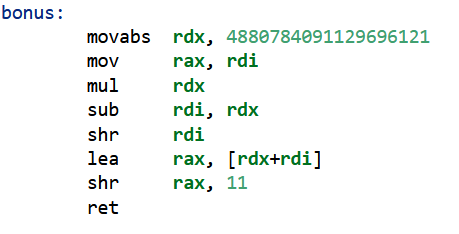
fixed constant (2048/3239)
The constant should be equal with 1/2+ arg1c»64/(2arg1)
This should work for most of our values:
C
long stuff(long long a){ return a1/3239; }
Python temp=0 for i in range(-5000,50000,1): arg1=i d=4880784091129696121 a=arg1 d=d*a a=d&0xFFFFFFFFFFFFFFFF d=d»64 arg1=arg1-d arg1=arg1»1 a=d+arg1 a=a»11 temp2=a if(temp2!=temp): temp=temp2 print(i) ```
Comments